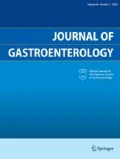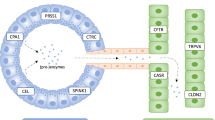Abstract
Background
Hereditary pancreatitis (HP) is a rare cause of chronic pancreatitis. We here report a nationwide survey to clarify the epidemiological, genetic, and clinical features of HP in Japan.
Methods
Target subjects were patients with HP and their family members who had visited selected hospitals between 2005 and 2014. This study consisted of two-stage surveys; patients with HP were identified by the first questionnaire and their clinical features were assessed by the second questionnaire.
Results
Two hundred seventy-one patients (153 males and 118 females) in 100 families diagnosed based on the Japanese criteria or 231 patients (131 males and 100 females) patients in 80 families based on the EUROPAC criteria were reported. Of the families undertaking genetic tests, 41% had the PRSS1 mutations (p.R122H 33%, p.N29I 8%) and 36% had the SPINK1 mutations (p.N34S 22%, c.194+2T>C 14%, p.P45S 1%). The mean age at symptom onset was 17.8 years. The cumulative rates of pancreatic exocrine insufficiency and diabetes mellitus were 16.1 and 5.5% at 20 years old, and 45.3 and 28.2% at 40 years, respectively. Forty-four percent of the patients underwent endoscopic treatment and/or surgery. The cumulative rate of pancreatic cancer diagnosis was 2.8% at 40 years old, 10.8% at 60 years, and 22.8% at 70 years.
Conclusions
HP was characterized by early disease onset, frequent development of pancreatic exocrine insufficiency and diabetes mellitus, requirement of endoscopic treatment and/or surgery, and increased risk of pancreatic cancer. PRSS1 and SPINK1 mutations serve as genetic background for HP in Japan.





Similar content being viewed by others
Abbreviations
- CI:
-
Confidence interval
- CP:
-
Chronic pancreatitis
- DM:
-
Diabetes mellitus
- HP:
-
Hereditary pancreatitis
- EUROPAC:
-
European Registry of Hereditary Pancreatitis and Familial Pancreatic Cancer
- PC:
-
Pancreatic cancer
- PEI:
-
Pancreatic exocrine insufficiency
- RAP:
-
Recurrent acute pancreatitis
- SD:
-
Standard deviation
References
Rebours V, Lévy P, Ruszniewski P. An overview of hereditary pancreatitis. Dig Liver Dis. 2012;44:8–15.
Raphael KL, Willingham FF. Hereditary pancreatitis: current perspectives. Clin Exp Gastroenterol. 2016;9:197–207.
Comfort MW, Steinberg AG. Pedigree of a family with hereditary chronic relapsing pancreatitis. Gastroenterology. 1952;21:54–63.
Whitcomb DC, Gorry MC, Preston RA, et al. Hereditary pancreatitis is caused by a mutation in the cationic trypsinogen gene. Nat Genet. 1996;14:141–5.
Gorry MC, Gabbaizedeh D, Furey W, et al. Mutations in the cationic trypsinogen gene are associated with recurrent acute and chronic pancreatitis. Gastroenterology. 1997;113:1063–8.
Howes N, Lerch MM, Greenhalf W, et al. Clinical and genetic characteristics of hereditary pancreatitis in Europe. Clin Gastroenterol Hepatol. 2004;2:252–61.
Rebours V, Boutron-Ruault MC, Schnee M, et al. The natural history of hereditary pancreatitis: a national series. Gut. 2009;58:97–103.
Joergensen MT, Brusgaard K, Crüger DG, et al. Genetic, epidemiological, and clinical aspects of hereditary pancreatitis: a population-based cohort study in Denmark. Am J Gastroenterol. 2010;105:1876–83.
Witt H, Luck W, Hennies HC, et al. Mutations in the gene encoding the serine protease inhibitor, Kazal type 1 are associated with chronic pancreatitis. Nat Genet. 2000;25:213–6.
Kume K, Masamune A, Kikuta K, et al. [–215G>A; IVS3+2T>C] mutation in the SPINK1 gene causes exon 3 skipping and loss of the trypsin binding site. Gut. 2006;55:1214.
Zou WB, Boulling A, Masamune A, et al. No association between CEL-HYB hybrid allele and chronic pancreatitis in Asian populations. Gastroenterology. 2016;150:1558–1560.e5.
Masamune A. Genetics of pancreatitis: the 2014 update. Tohoku J Exp Med. 2014;232:69–77.
Otsuki M, Nishimori I, Hayakawa T, et al. Hereditary pancreatitis: clinical characteristics and diagnostic criteria in Japan. Pancreas. 2004;28:200–6.
American Diabetes Association. Diagnosis and classification of diabetes mellitus. Diabetes Care. 2014;37(Suppl 1):S81–90.
Nishimori I, Kamakura M, Fujikawa-Adachi K, et al. Mutations in exons 2 and 3 of the cationic trypsinogen gene in Japanese families with hereditary pancreatitis. Gut. 1999;44:259–63.
Kume K, Masamune A, Mizutamari H, et al. Mutations in the serine protease inhibitor Kazal Type 1 (SPINK1) gene in Japanese patients with pancreatitis. Pancreatology. 2005;5:354–60.
Nakano E, Masamune A, Niihori T, et al. Targeted next-generation sequencing effectively analyzed the cystic fibrosis transmembrane conductance regulator gene in pancreatitis. Dig Dis Sci. 2015;60:1297–307.
Rosendahl J, Witt H, Szmola R, et al. Chymotrypsin C (CTRC) variants that diminish activity or secretion are associated with chronic pancreatitis. Nat Genet. 2008;40:78–82.
Witt H, Beer S, Rosendahl J, et al. Variants in CPA1 are strongly associated with early onset chronic pancreatitis. Nat Genet. 2013;45:1216–20.
Kume K, Masamune A, Ariga H, et al. Do genetic variants in the SPINK1 gene affect the level of serum PSTI? J Gastroenterol. 2012;47:1267–74.
Hirota M, Shimosegawa T, Masamune A, et al. The seventh nationwide epidemiological survey for chronic pancreatitis in Japan: clinical significance of smoking habit in Japanese patients. Pancreatology. 2014;14:490–6.
Oracz G, Kolodziejczyk E, Sobczynska-Tomaszewska A, et al. The clinical course of hereditary pancreatitis in children—A comprehensive analysis of 41 cases. Pancreatology. 2016;16:535–41.
Issa Y, Bruno MJ, Bakker OJ, et al. Treatment options for chronic pancreatitis. Nat Rev Gastroenterol Hepatol. 2014;11:556–64.
Majumder S, Chari ST. Chronic pancreatitis. Lancet. 2016;387:1957–66.
Kargl S, Kienbauer M, Duba HC, et al. Therapeutic step-up strategy for management of hereditary pancreatitis in children. J Pediatr Surg. 2015;50:511–4.
Patel MR, Eppolito AL, Willingham FF. Hereditary pancreatitis for the endoscopist. Therap Adv Gastroenterol. 2013;6:169–79.
Lowenfels AB, Maisonneuve P, DiMagno EP, et al. Hereditary pancreatitis and the risk of pancreatic cancer. International Hereditary Pancreatitis Study Group. J Natl Cancer Inst. 1997;89:442–6.
Rebours V, Boutron-Ruault MC, Schnee M, et al. Risk of pancreatic adenocarcinoma in patients with hereditary pancreatitis: a national exhaustive series. Am J Gastroenterol. 2008;103:111–9.
Masamune A, Mizutamari H, Kume K, et al. Hereditary pancreatitis as the premalignant disease: a Japanese case of pancreatic cancer involving the SPINK1 gene mutation N34S. Pancreas. 2004;28:305–10.
Bruenderman E, Martin RC 2nd. A cost analysis of a pancreatic cancer screening protocol in high-risk populations. Am J Surg. 2015;210:409–16.
Acknowledgements
The authors are grateful to the doctors who replied to the questionnaires. This work was supported in part by JSPS KAKENHI Grant Number 16K15421 (to A Masamune), the Smoking Research Foundation (to A Masamune), and by the Ministry of Health, Labour, and Welfare of Japan (to Y Takeyama and M Nio).
Author information
Authors and Affiliations
Corresponding author
Ethics declarations
Conflict of interest
The authors declare that they have no conflicts of interest.
Rights and permissions
About this article
Cite this article
Masamune, A., Kikuta, K., Hamada, S. et al. Nationwide survey of hereditary pancreatitis in Japan. J Gastroenterol 53, 152–160 (2018). https://doi.org/10.1007/s00535-017-1388-0
Received:
Accepted:
Published:
Issue Date:
DOI: https://doi.org/10.1007/s00535-017-1388-0




